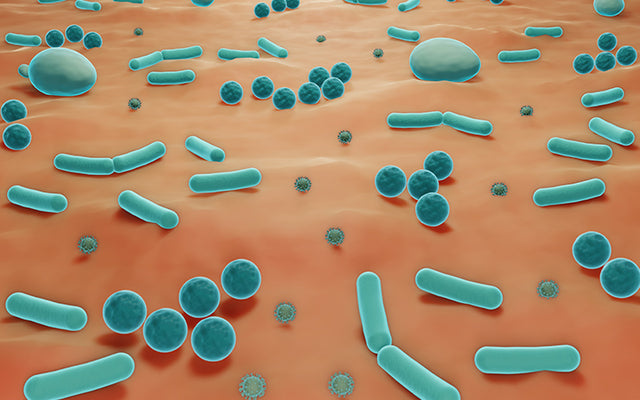Have you ever wondered what guards your skin against external pathogens? It is the skin microbiome. This is the ecosystem of bacteria present on the surface of your skin. It protects you against all outside components, pollutants, and allergens that may threaten your skin’s health.
However, there are a lot of factors that may affect your skin’s microbiome. Hence, it is essential to learn what can harm your skin microbiome and how to keep it safe. So, here’s everything that you need to know about it.
Highlights:
What Is The Skin’s Microbiome? How Does It Function?
Skin is the largest organ of your body. An uncountable amount of microorganisms like bacteria, fungi and viruses are present in the outer layer of your skin. They are called microbiome or microbiota. Though not visible to the naked eye, these microorganisms play a crucial role in protecting your skin and maintaining your health. [1] In fact, it is safe to say that the microbiome is your skin’s defence system.
The microbiome develops right after you are born as soon as your skin comes in contact with the outside world. Staphylococcae, corynebacteria and cutibacteria are some of the bacteria that reside in your skin. These primarily help to create your immune system and prepare your skin to fight against outside pathogens. When the outside bacteria or harmful germs attack your skin, the resident bacteria in your skin fight back.
What Microorganisms Are Commonly Found In The Skin Microbiome?
Skin experts have divided your skin into three anatomical sites to understand more about the microorganisms of your skin. They are dry, moist and oily or sebaceous. These regions are home to different microorganisms.[2]
1. Dry Site
Forearms, hands, legs and feet are considered the dry site of your body. These areas of your body are most exposed to the outside world. Therefore, a diverse variety of bacteria reside in these body parts to protect them. Staphylococcus is one of the residing microorganisms on the dry site.
2. Moist Site
The moist areas in your body usually refer to the areas where your skin folds. This includes areas such as elbows, under the breasts, in-between toes, and the groin. Corynebacterium is usually present at the moist site.
3. Sebaceous Site
Sebaceous sites of your body are the head, neck and torso. The microorganisms that thrive here include cutibacteria, demodex mites, and fungus malasezzia.
Why Is Your Skin Microbiome Important?
The skin microbiome works as the protective layer of your skin. It works in many ways to fight against pollutants, allergens and harmful bacteria. Here is a list of what the microbiome does for your skin.
1. Prevents Infections
The skin microbiome has natural antibacterial properties. Also, the microorganisms present on skin develop in an acidic environment. As the infectious pathogens are not fond of acidic atmospheres, they cannot affect your skin as long as the microbiome is intact. The preferred pH level for the microbiome is around 5.
2. Boosts Immune System
When a child is born, the microbiome in the skin starts helping the body in building the immune system. Gradually, the microbiome becomes a warning alarm for the immune system. So, when the body comes into contact with harmful substances or viruses, the microbiome communicates with the immune system and alerts it to fight against the pathogens.
3. Treats Inflammation
When any kind of inflammation happens, the microbes send a message to the immune system to heal it. The immune system then releases antimicrobial peptides to control the inflammation. Cathelicidin is one such antimicrobial substance that heals your skin from inflammation.[3]
What Affects Your Skin Microbiome?
General Factors That Affects Your Skin Microbiome
1. Genetics
2. Unhealthy diet
3. Pollution
4. Too much exposure to sunlight
5. Smoking
6. Chronic alcoholism
Skin Conditions That Affects Your Skin Microbiome
1. Atopic dermatitis
2. Unhealed wounds
3. Acne
4. Eczema
5. Vitiligo
6. Warts
How To Restore Your Skin Microbiome?
- In many cases, over-washing or too much sanitizing can affect the microbes of your skin. Curb the habit immediately. Also, minimize the usage of antibacterial products to wash your skin all the time.
- Moisturizing your skin can boost your skin microbiome. It will keep your skin supple and healthy. Also, moisturization reduces the chances of skin conditions like psoriasis, allergies and eczema. Shea butter, petroleum gel, cocoa butter are good options for skin moisturization.
- Studies suggest that the microbe of your gut also affects the skin. While the correlation is still not clear, experts suggest that a healthy diet can help the microbiome. Add a lot of leafy vegetables to your meals. Make sure you are getting the right amount of vitamins, protein and minerals. Avoid gluten and dairy products.
- Engage yourself in physical activity like exercise, jogging, dancing, cycling etc.
- If you have any kind of skin condition that is not healing, take medical advice immediately.
- Understand your skin type and follow a good skin care regimen.
Does The Skin Microbiome Change As You Age?
The composition of your skin microbiome changes a lot as you start ageing. Microbial changes in adult skin are highly related to physiological changes due to ageing. Also, ageing-related diseases affect the skin microbiome. Health issues like diabetes, irregular bowel syndrome etc can affect the microbes. A study conducted between two age groups of 25-35 years and 56-63 years clearly showed that skin microbiome changes with age.
Wrapping Up
The microbiome is the protector of your skin. But it is extremely delicate and needs a lot of nurturing. To ensure that your microbiome is not compromised and functioning perfectly, maintain a good diet, avoid unhealthy lifestyle habits and take care of your skin.
In case, your skin microbiome does not get restored even after your efforts, seeking medical help is the best thing to do. The dermatologist may prescribe some oral medicines, skin ointments and supplements to bring the microbes back.
Recommended Products
Was this Article helpful?
- Least helpful
- Most helpful











